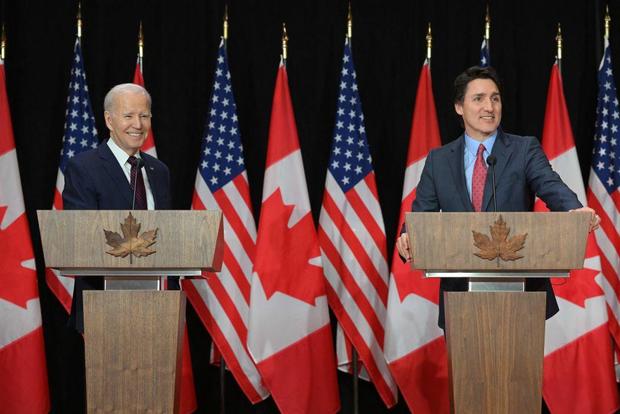President Biden and Canadian Prime Minister Justin Trudeau vowed to continue and strengthen their cooperation on trade, security and addressing climate change Friday after a day of meetings, speeches and a joint press conference in Ottawa.
Trudeau hosted the president for a state visit in the Canadian capital, the first time Mr. Biden has traveled to the U.S. neighbor to the north as president. The pair addressed the Canadian Parliament and held bilateral talks before holding a joint press conference. Trudeau is hosting the president and first lady for a gala dinner Friday night.
In his speech to Parliament, Mr. Biden underscored the lengthy and robust relationship between Canada and the United States. The leaders issued a joint statement documenting their commitment to embrace clean energy and create good jobs, strengthen semiconductor supply chains, protect their shared waters and the Arctic ecosystem, and bolster global alliances such as NATO, the United Nations and the G20.
“Today I say to you, and to all of the people of Canada, that you will always, always be able to count on the United States of America,” Mr. Biden said. “Nothing gives me greater confidence in the future than knowing Canada and the United States stand together still.”
In his remarks, Trudeau emphasized the importance of the U.S.-Canadian partnership in developing clean energy and technology, and boosting production capacity for semiconductors and electric vehicles.
“This time, with all the challenges we face, we are doubling down on our partnership and on our friendship,” Trudeau said.
MANDEL NGAN/AFP via Getty Images
Canada is one of the United States’ closest allies, with a shared border that makes the country a critical economic and trade partner. In one concrete development to emerge from the trip, the two leaders announced a deal on migration aimed at stemming the flow of thousands of asylum-seekers across the border.
A 2004 pact has allowed American and Canadian border officials to send some asylum-seekers across the border under the premise that both nations are safe countries where migrants can seek humanitarian refuge. But the agreement has only applied at official border crossings, meaning that American and Canadian authorities have been unable to turn away asylum-seekers who cross into each country illegally.
The new agreement will close this loophole and allow either country to send back asylum-seekers, even those who cross between border checkpoints. Canada has been dealing with an influx of tens of thousands of asylum-seekers who have crossed into the country from the U.S. between official checkpoints, and they have sought this change for years.
“The United States and Canada will work together to discourage unlawful border crossings and fully implement the updated ‘safe third country’ agreement,” Mr. Biden told members of Parliament. In exchange for the new enforcement measures, Canada will accept 15,000 more migrants from across the Western Hemisphere.
National security issues were also a focus of the president’s visit. Canada, a NATO ally, has joined the U.S. and European allies in supporting Ukraine in its war with Russia and has welcomed Ukrainian refugees, provided humanitarian and military aid and issued targeted sanctions targeting the Kremlin. Trudeau reiterated Canada’s “steadfast support for the Ukrainian people” and vowed to continue to help Ukraine repel Russia’s “barbaric invasion.”
In their press conference, Mr. Biden fielded a question about the U.S. banking system, and said he was confident the problems in the industry are contained following multiple bank failures.
“First of all, have you ever known Wall Street not in consternation, number one?” Mr. Biden said, referencing uncertainty in the markets. “Look, I think we’ve done a pretty damn good job. Peoples’ savings are secure.”
The president said the federal government could take more steps to secure deposits “if we find that there’s more instability than it appears.”
“I think it’s going to take a little while for things to just calm down, but I don’t see anything that’s on the horizon that’s about to explode,” he said. “But I do understand there’s an unease about this. And these midsize banks have to be able to survive, and I think they’ll be able to do that.”
Camilo Montoya-Galvez contributed reporting.

